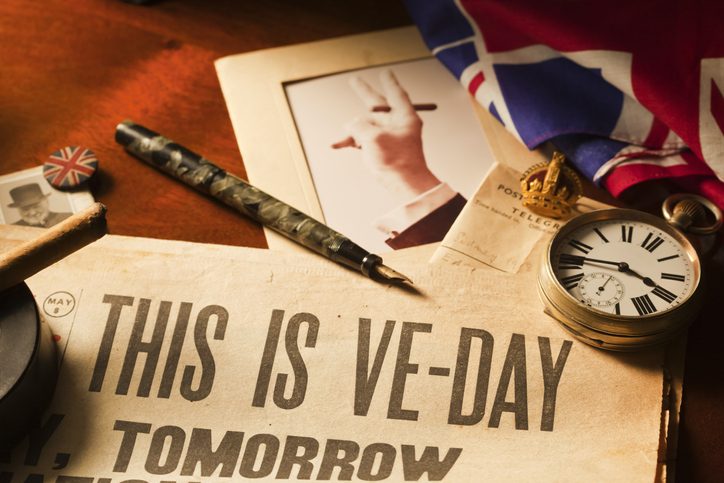
May 5, 2020, by Katie Andrews
VE Day 75 years on: a European perspective
This guest blog was written by Professor Elizabeth Harvey, in the Department of History, to commemorate the 75th anniversary of VE Day.
What are we celebrating when we celebrate VE Day? And who is ‘we’? For a long time time now, a cliched narrative has taken hold in Britain that plays up Britain’s contribution to Allied victory. The understandable wish to honour the British war dead and the remaining veterans has been overlaid by ceremonies and flypasts with accompanying media frenzy. All this cements a comforting but simplistic myth of Britain standing alone and united in face of tyranny.
In the UK we would do well to mark the 75th anniversary of VE Day by looking away from the historic footage of dancing in Trafalgar Square, from the flags and the patriotic bunting, and turning our thoughts in new directions. Firstly, to recall what liberation meant to the millions across Europe whose experiences of war, occupation, displacement and hunger were utterly different from and far more drastic than those experienced on the ‘home front’ in Britain. If it hadn’t been cancelled because of Covid-19, I would have spent 8 May 2020 taking part in a history festival in Berlin designed to reflect on what ended and what began in May 1945, and to commemorate the victims of the war and Nazi genocide. We had planned to read extracts from diaries and letters written by surviving Jews from the last weeks and days of the war in Europe. Among these extracts is a diary written by Toni Ringel, a Jewish woman in her late fifties, written in the attic hiding place in Amsterdam where she and her husband had taken refuge since September 1942. In March 1945, she had written: ‘It will not be long now to the wonderful moment of liberation. We are on the way to freedom and happiness for all persecuted and oppressed peoples.’ Toni Ringel survived to witness it, but her husband, in his late sixties, did not: in April 1945, following the ‘hunger winter’ in the occupied Netherlands in 1944/45, he died of malnutrition and heart failure.
A second direction in which our thoughts could take us is to the political hopes and fears of people living in liberated Europe about what the end of the war might bring. Would it bring self-determination, the rebirth of nations? What would the looming stand-off between the Soviet Union and the USA mean for freedom and democracy in Europe? For the peoples of occupied Europe and indeed for those Germans who had opposed the Nazis, alongside the struggle to restore families and rebuild communities there were conflicting urges for justice and for revenge. Recalling this moment can help us understand the energy and idealism of those who went on to create supra-national institutions in Western Europe that would serve to reconcile former enemies and create new forms of international solidarity. Remembering VE Day can be a chance to pay tribute to those across Europe who looked forward to building peace.
No comments yet, fill out a comment to be the first

Leave a Reply